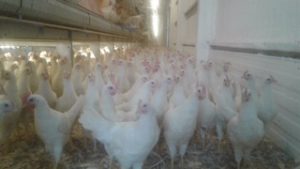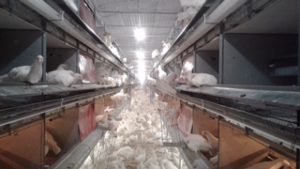Granja Siete Hermanos, S.R.L – Crespo, Entre Ríos state, Argentina
 The Granja Siete Hermanos S.R.L., located in the province of Entre Ríos in the City of Crespo, Argentina, is owned and operated by the Eberle brothers. Founded by Don Jorge Roberto Eberle in the 1960s with a few cage-free hens, the farm has been family-operated for more than three generations. Today, seven Eberle brothers work side-by-side managing the daily operations of the farm.
The Granja Siete Hermanos S.R.L., located in the province of Entre Ríos in the City of Crespo, Argentina, is owned and operated by the Eberle brothers. Founded by Don Jorge Roberto Eberle in the 1960s with a few cage-free hens, the farm has been family-operated for more than three generations. Today, seven Eberle brothers work side-by-side managing the daily operations of the farm.
While the farm started cage-free in the 60s, it moved to battery cages in the 70s. “I still remember telling dad that we were going to move the laying hens to a barn and put them in battery cages,” says Hector Humberto Eberle, General Manager for Granja Siete Hermanos. “He told me that the chickens had to be free and that they were going to die locked up all day. I didn’t know how we were going to put so many chickens in a barn. We did, but my dad was right. It wasn’t a humane way to raise the birds.”
While many other farms in Argentina still operate with traditional pyramidal cages and battery cages, Granja Siete Hermanos is the first farm in Argentina to import a cage-free aviary system to meet Humane Farm Animal Care’s animal welfare standards for Certified Humane® laying hens.
“We learned about the Certified Humane® program through a client’s recommendation,” says Hector. “Once we learned about everything related to the welfare of the animals and that the guidelines were written by farm animal welfare experts, we decided to adopt their humane standards of care. We saw that you could respect animals, the environment and people while still being efficient in egg production.”
 But Hector remembers being a little apprehensive when the new aviary system arrived. “The manufacturers told us that one of the biggest hurdles would occur at sunset when the laying hens would all be trying to find a place to sleep and none should be on the floor,” says Hector. “We were worried, but at sunset, we watched in amazement as every hen found a place to perch and sleep. It was unforgettable. We also worried that the hens would not use the nests to lay their eggs, but we were wrong. The hens wanted privacy, and they were very comfortable with these new nesting spaces.”
But Hector remembers being a little apprehensive when the new aviary system arrived. “The manufacturers told us that one of the biggest hurdles would occur at sunset when the laying hens would all be trying to find a place to sleep and none should be on the floor,” says Hector. “We were worried, but at sunset, we watched in amazement as every hen found a place to perch and sleep. It was unforgettable. We also worried that the hens would not use the nests to lay their eggs, but we were wrong. The hens wanted privacy, and they were very comfortable with these new nesting spaces.”
Hector says that once the farm implemented HFAC’s animal welfare standards and saw how easily the laying hens adapted to their new aviary, they knew they were making the right decision and trusted the Certified Humane® practices would contribute to the overall welfare of their laying hens.
“We can see the impact on the hens every day,” says Hector. “We are raising happy animals that are free to express their natural behaviors, like stretching their wings, scratching, perching and nesting. Our farm is proof that you can raise Certified Humane® laying hens and not impact production parameters.”
Hector says, “More and more news stories, books, films, and reports draw attention to how farm animals should be treated. As a result, consumers want products from animals that are humanely-raised. The Certified Humane ® label identifies our products for businesses and consumers looking for those products… Being Certified Humane® is good for our business, our animals and our customers.”

Granja Siete Hermanos
Posted: March 4, 2019 by Certified Humane®
Granja Siete Hermanos, S.R.L – Crespo, Entre Ríos state, Argentina
While the farm started cage-free in the 60s, it moved to battery cages in the 70s. “I still remember telling dad that we were going to move the laying hens to a barn and put them in battery cages,” says Hector Humberto Eberle, General Manager for Granja Siete Hermanos. “He told me that the chickens had to be free and that they were going to die locked up all day. I didn’t know how we were going to put so many chickens in a barn. We did, but my dad was right. It wasn’t a humane way to raise the birds.”
While many other farms in Argentina still operate with traditional pyramidal cages and battery cages, Granja Siete Hermanos is the first farm in Argentina to import a cage-free aviary system to meet Humane Farm Animal Care’s animal welfare standards for Certified Humane® laying hens.
“We learned about the Certified Humane® program through a client’s recommendation,” says Hector. “Once we learned about everything related to the welfare of the animals and that the guidelines were written by farm animal welfare experts, we decided to adopt their humane standards of care. We saw that you could respect animals, the environment and people while still being efficient in egg production.”
Hector says that once the farm implemented HFAC’s animal welfare standards and saw how easily the laying hens adapted to their new aviary, they knew they were making the right decision and trusted the Certified Humane® practices would contribute to the overall welfare of their laying hens.
“We can see the impact on the hens every day,” says Hector. “We are raising happy animals that are free to express their natural behaviors, like stretching their wings, scratching, perching and nesting. Our farm is proof that you can raise Certified Humane® laying hens and not impact production parameters.”
Hector says, “More and more news stories, books, films, and reports draw attention to how farm animals should be treated. As a result, consumers want products from animals that are humanely-raised. The Certified Humane ® label identifies our products for businesses and consumers looking for those products… Being Certified Humane® is good for our business, our animals and our customers.”
Category: bios, Blog